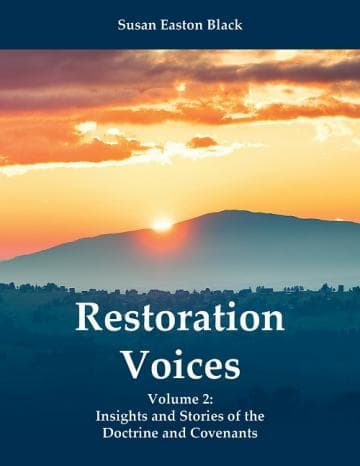Book
140 Chapters

On May 16, 1843, the Prophet Joseph Smith and his traveling party took lodging with William G. Perkins in Ramus, Illinois. Before retiring for the evening, the Prophet Joseph dictated to William Clayton instructions contained in Doctrine and Covenants 131:1–4. The next morning, May 17, in a small gathering of faithful friends, Joseph preached from 2 Peter, chapter 1, showing the correlation between knowledge and power and defining the “more sure word of prophecy [as] a man’s knowing that he is sealed up unto eternal life, by revelation and the spirit of prophecy” (D&C 131:5). Verses 5 and 6 were then dictated by Joseph, with Clayton again acting as scribe. That evening, Joseph listened to a lecture by Samuel Prior, a Methodist preacher. After the lecture, Joseph corrected the doctrinal misconceptions of the preacher. The corrections are contained in verses 7 and 8. The three instructive insights were combined together to create Doctrine and Covenants 131.
Joseph Smith elaborated on the spirit of prophecy—“the more sure word of prophecy”:
Though they might hear the voice of God and know that Jesus was the Son of God, ... they then would want that more sure word of prophecy, that they were sealed in the heavens and had the promise of eternal life in the kingdom of God. Then, having this promise sealed unto them, it was an anchor to the soul, sure and steadfast. Though the thunders might roll and lightnings flash, and earthquakes bellow, and war gather thick around, yet this hope and knowledge would support the soul in every hour of trial, trouble and tribulation.[1]
Elder Boyd K. Packer, in his general conference address in October 2011, told the story of a patriarch having the spirit of prophecy and assuring Elder Packer that if he would keep the commandments, his life would be spared in tribulation:
By the time we graduated from high school, many of our classmates had marched away to war, some of them never to return. The rest of us were soon to enter the military. We did not know about our future. Would we survive the war? Would there be enough of the world left when we returned?
Against the certainty that I would be drafted, I joined the air force. Soon I was in Santa Ana, California, for preflight training.
I did not then have a firm testimony that the gospel was true, but I knew that my seminary teachers, Abel S. Rich and John P. Lillywhite, knew it was true. I had heard them testify, and I believed them. I thought to myself, “I will lean on their testimonies until I gain one of my own.” And so it was.
I had heard about patriarchal blessings but had not received one. In each stake there is an ordained patriarch who has the spirit of prophecy and the spirit of revelation. He is authorized to give personal and private blessings to those who come recommended by their bishops. I wrote to my bishop for a recommend.
J. Roland Sandstrom was the ordained patriarch living in the Santa Ana stake. He knew nothing about me and had never seen me before, but he gave me my blessing. In it I found answers and instruction.
While patriarchal blessings are very private, I will share a short quote from mine: “You shall be guided through the whisperings of the Holy Spirit and you shall be warned of dangers. If you heed those warnings, our Heavenly Father will bless you so that you might again be united with your loved ones.”
That word if, though small in print, loomed as big as the page. I would be blessed to return from the war if I kept the commandments and if I heeded the promptings of the Holy Ghost.[2]
Book
140 Chapters
Items in the BMC Archive are made publicly available for non-commercial, private use. Inclusion within the BMC Archive does not imply endorsement. Items do not represent the official views of The Church of Jesus Christ of Latter-day Saints or of Book of Mormon Central.